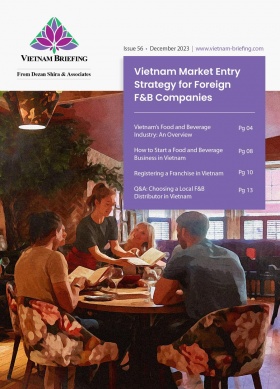Franchising in Vietnam: Legal Framework and Registration Requirements
Franchising in Vietnam has experienced remarkable growth in recent decades, buoyed by relaxed retail regulations and a dynamic entrepreneurial landscape. A strong legal framework provides businesses with clarity and protection for franchising activities and stringent registration requirements encourage fair practices within the industry.
The emergence of franchising in Vietnam gained momentum around 2009, following the relaxation of retail market regulations to meet WTO obligations. Since then, the franchise model has experienced rapid growth, with numerous renowned foreign brands penetrating the Vietnamese market through franchise networks. While traditionally dominated by foreign franchisors, there’s been a notable rise in Vietnamese brands franchising both domestically and internationally.
Indeed, franchising aligns well with Vietnam’s vibrant entrepreneurial culture, offering an appealing avenue for small and medium-sized entrepreneurs seeking to swiftly establish new ventures. Moreover, franchising presents a lower risk alternative with a modest capital investment requirement and a proven track record of success compared to launching entirely new businesses. This trend isn’t limited to the fast food and beverage sector; it extends across various industries.
As franchising continues its rapid expansion in Vietnam, exploring its legal framework becomes imperative to understand the rights and obligations of both franchisors and franchisees, ensure compliance with relevant regulations, protect intellectual property, and facilitate fair and transparent business practices.
Overview of Vietnam’s franchising legal framework
Legal foundations of franchising in Vietnam
The legal framework governing franchising in Vietnam is established primarily by the Commercial Law, which was enacted by the National Assembly on June 14, 2005. These regulations are further detailed in Decree No. 35/2006/ND-CP, issued by the Government on March 31, 2006, and subsequently amended by Decrees No. 120/2011/ND-CP (December 16, 2011) and No. 08/2018/ND-CP (January 15, 2018).
Circular No. 09/2006/TT-BTM, issued by the Ministry of Industry and Trade (MOIT) on May 25, 2006, and amended by Circular No. 04/2016/TT-BCT of the MOIT, further supplements these regulations.
Additionally, provisions related to franchising can also be found in the Law on Intellectual Property, adopted by the National Assembly on November 29, 2005, with subsequent amendments in 2019 and 2022. The Law on Technology Transfer, enacted on June 19, 2017, and amended in 2023, also contains relevant regulations pertaining to franchising activities.
Notably, Vietnamese franchise law applies not only to franchising agreements between domestic parties but also extends its jurisdiction to foreign franchisors who grant franchises within Vietnam, as well as Vietnamese franchisors who establish franchise arrangements abroad.
Relevant authorities
The MOIT serves as the primary regulatory body overseeing franchising activities in Vietnam. It is responsible for providing guidance on the implementation of franchising policies and legislation, as well as facilitating the registration of franchises.
The MOIT accepts franchise registration applications from various entities, including those based overseas, operating within export processing zones, non-tariff areas, or separate customs zones.
At the provincial level, the Departments of Industry and Trade (DOITs), which are affiliated with the MOIT, oversee franchising activities within their respective regions. These provincial agencies also handle the submission of reports from Vietnamese franchisors who have established franchise agreements with either domestic or foreign franchisees.
Definition of franchising in Vietnam
The definition of franchising in Vietnam, as outlined in Article 284 of the Commercial Law 2005, pertains to a commercial arrangement wherein a franchisor grants authorization to a franchisee to independently engage in the buying and selling of goods or provision of services, subject to specific conditions:
- The franchisee must operate according to the franchisor’s prescribed business methods, incorporating elements such as trademark, trade name, business expertise, mission statements, logo, and advertising.
- The franchisor retains the right to oversee and support the franchisee in their business operations.
In essence, franchising involves the transfer of a bundle of commercial rights from the franchisor to the franchisee, including those delineated in the Commercial Law 2005, such as trademark, trade name, business know-how, and promotional materials.
Additionally, as per Article 3.6 of Decree 35/2006/ND-CP, the following are also recognized as “commercial rights” within the framework of franchising:
- Commercial rights bestowed by the franchisor to the primary franchisee;
- Rights sublicensed by the secondary franchisor to the secondary franchisee pursuant to the master franchising contract; and
- Commercial rights granted by the franchisor to the franchisee under the commercial right development contract.
Registration requirements
Franchise registration process and considerations
Franchise registration in Vietnam involves adherence to specific requirements, applicable to both foreign franchises and those originating from designated areas such as export processing zones or separate customs areas. Notably, offshore franchisors are only required to register their franchising business once, a process overseen by the MOIT.
Required documentation
Circular No. 09/2006/BTM specifies the documents required for registration, including:
- A franchising registration form; and
- A franchise introduction document (“Franchise Disclosure Document”) compliant with the prescribed format.
The Franchise Disclosure Document must contain the following information:
- Details about the franchisor, including the organizational structure, roles, and experience of board members, department responsible for franchising, and any litigation related to franchising activities within the past year;
- Information about the trademarks and intellectual property associated with the goods/services being franchised;
- Costs and financial obligations for the franchisee, initial investments required, equipment procurement or leasing obligations in alignment with the franchisor’s business model, and other financial commitments;
- Franchisee responsibilities regarding equipment acquisition or leasing in accordance with the franchisor’s business model, and other financial commitments;
- Franchisor obligations prior to and during contract signing and operation, such as training requirements, decisions regarding business premises, and additional training opportunities;
- Overview of the market for the goods/services covered by the franchise contract, and future market prospects;
- Details about the franchisor’s franchise system, including the number of active and discontinued franchise establishments, signed, transferred, or terminated franchise contracts, etc.; and
- A sample franchise agreement outlining contract provisions, duration, renewal conditions, termination conditions for both parties, post-termination obligations, contract amendments, conditions for contract assignment, regulations regarding death cases, and a statement of compliance with conditions for both parties.
Other required documents include:
- An Incorporation Certificate for foreign entities;
- Intellectual property protection documents for Vietnam or foreign countries if the franchisor plans to license IP to the franchisee;
- Audited financial statements of the previous year; and
- Approval documents for sub-franchising into Vietnam (if applicable).
MOIT evaluation and timeframe
The MOIT reserves the right to assess the submitted documentation for compliance with disclosure requirements. While the regulatory timeframe for registration is officially set at five working days from the submission of a complete dossier, practical processing times may extend up to a month.
Consular legalization and translation
Foreign documents typically need consular legalization and translation into Vietnamese before submission to State authorities. While most documents in the franchise dossier require legalization and translation, the application for franchising registration is an exception.
In cases where amendments or supplements are required by the MOIT during the franchising registration process, it is uncertain whether these modified documents need consular legalization. However, generally, if the MOIT approves the modifications without requiring consular legalization, it aligns with existing laws.
Updating changes and periodical reporting
The franchisor must inform the MOIT within 30 days of any modifications to registered information, particularly changes in Part A of the Franchise Introduction (Disclosure Document), such as franchisor details or trademark alterations.
Additionally, the franchisor is obligated to periodically report to the MOIT regarding Part B of the Franchise Introduction, including franchisee investment costs and sample franchise contracts.
Costs and fees
Since 2017, there are no State costs or fees associated with franchising registration in Vietnam.
Penalties for failed registration
Under Article 75.3 of Decree No. 98/2020/ND-CP, failure to register for franchising activities may result in fines ranging from VND 5,000,000 (approx. US$197) to 10,000,000 (approx. US$394) for individual franchisors and from VND 10,000,000 (approx. US$394) to 20,000,000 (approx. US$788) for franchisor organizations.
Considerations on franchise agreements
Franchise agreements in Vietnam afford parties significant flexibility in negotiating terms and conditions. While Decree 35 offers suggested terms, their inclusion is not obligatory.
Notably, the franchise agreement itself need not be included in the registration dossier unless it is necessary to register associated intellectual property rights.
Technology transfer and legal obligations
The transfer of technology integral to a franchise arrangement is subject to the provisions of the Law on Technology Transfer. Written agreements are required for technology transfers, with specific registration requirements outlined for various circumstances, including transfers involving overseas parties or state capital. Compliance with national interests, health, cultural values, and environmental standards, as well as adherence to international agreements, is mandated. Certificates issued by the Ministry of Science and Technology may be necessary in restricted technology transfer areas.
Key takeaways
Vietnam’s flourishing economy presents lucrative opportunities for foreign investors looking to expand through franchising. Understanding franchise agreements is paramount for companies intending to pursue this avenue.
Despite regulatory adjustments over time, Vietnam offers a robust legal foundation for franchising. As such, both franchisors and franchisees are advised to meticulously review relevant regulations before entering contracts, ensuring the enduring success of their business endeavors.
About Us
Vietnam Briefing is one of five regional publications under the Asia Briefing brand. It is supported by Dezan Shira & Associates, a pan-Asia, multi-disciplinary professional services firm that assists foreign investors throughout Asia, including through offices in Hanoi, Ho Chi Minh City, and Da Nang in Vietnam. Dezan Shira & Associates also maintains offices or has alliance partners assisting foreign investors in China, Hong Kong SAR, Indonesia, Singapore, Malaysia, Mongolia, Dubai (UAE), Japan, South Korea, Nepal, The Philippines, Sri Lanka, Thailand, Italy, Germany, Bangladesh, Australia, United States, and United Kingdom and Ireland.
For a complimentary subscription to Vietnam Briefing’s content products, please click here. For support with establishing a business in Vietnam or for assistance in analyzing and entering markets, please contact the firm at vietnam@dezshira.com or visit us at www.dezshira.com
- Previous Article Dong Nai Province, Vietnam: Opportunities in the Leading Industrial Production Hub
- Next Article Legge vietnamita sulla protezione dei dati personali: ultimi sviluppi e approfondimenti








